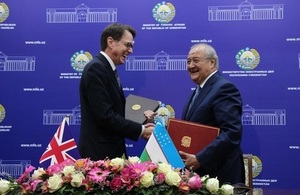The United Kingdom – a leader in climate protection
Heat, drought, failed harvests – climate change is increasingly being felt in Europe. Scientists who have long been warning of the consequences of climate change are finding they now have a more receptive audience.
In Britain, both the public and the political establishment recognised the urgency of the climate crisis early on and responded by putting measures in place which have contributed to UK’s positive record on climate protection. As long ago as 2008 there was a broad consensus in the House of Commons in favour of the “UK Climate Change Act“, the world’s first climate protection bill, with ambitious targets and an independent supervisory panel.
In June 2019, the Climate Change Act was expanded to include an objective of carbon-neutrality by 2050. UK emissions have fallen by 42% since 1990, while economic productivity has risen by two-thirds. This is above all due to the decline in coal-fuelled power and the expansion of renewable energies, in particular offshore wind. 5 years ago, 40% of British electricity came from coal power stations – now it is just under 5%. Science is making an important contribution in developing new approaches and more efficient technologies.
The UK is also active in promoting climate protection on the international stage. It contributes financially by supporting projects aimed at reducing and adapting to climate change worldwide (e.g. in supporting anti-deforestation projects together with Germany and Norway). Politically, too, the UK is at the forefront with its “nomination” to host COP 26, the UN’s climate conference in 2020 in partnership with Italy – a milestone on the path to fulfilling the terms of the Paris Agreement. Britain is making a scientific contribution, too, by carrying out fundamental research and developing technologies in collaboration with international partners such as Germany. And as an important financial centre, the UK has a role to play in pushing for greater sustainability in the finance sector.

